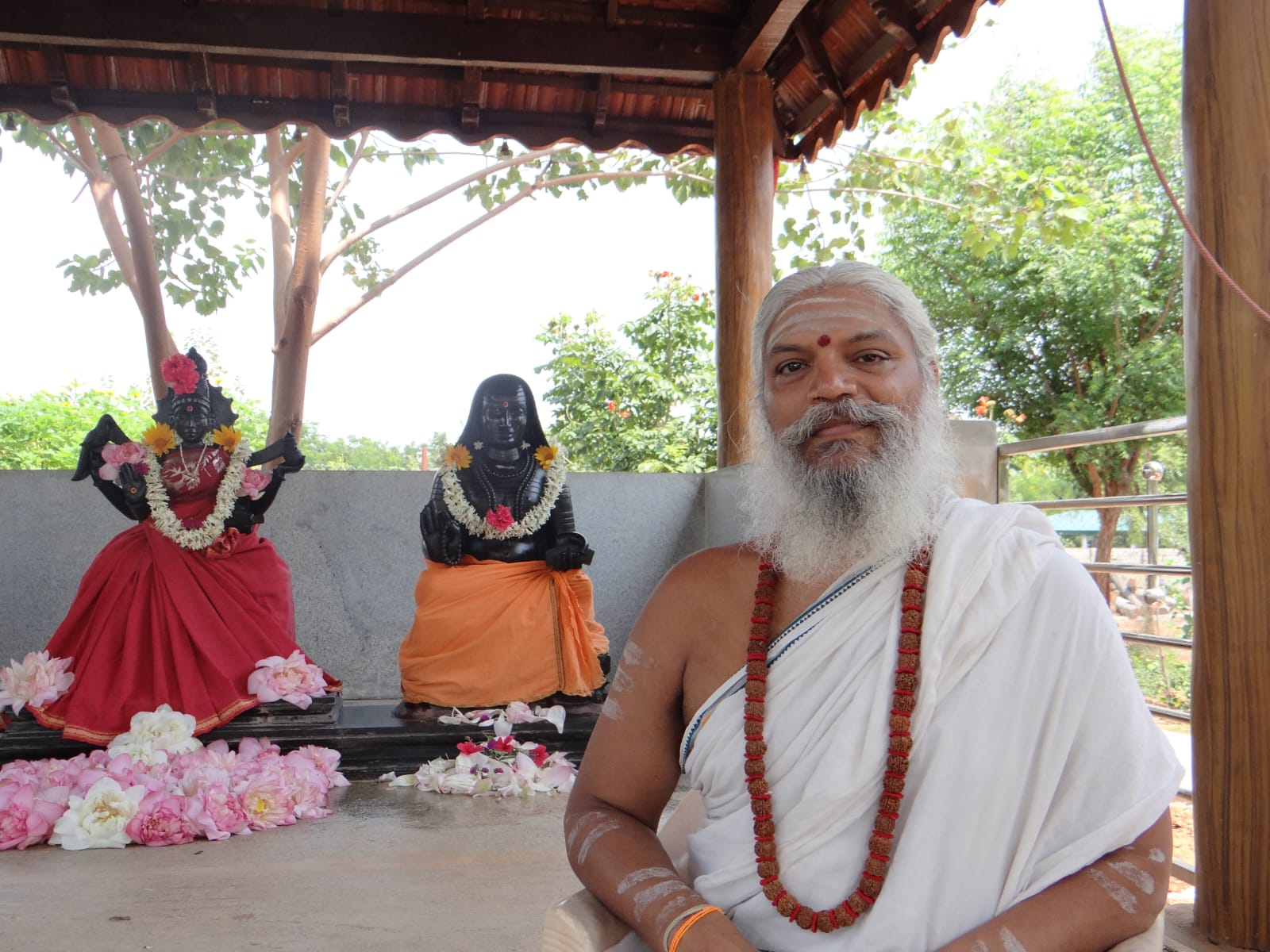Young entrepreneur Dhrupad Vipat is a founder member of Stealth Startup. Speaking about entrepreneurship in the Dharmic space he says, "During an entrepreneurial journey one of the key aspects responsible for conviction behind an idea is validation through data and market feedback. Building conviction in the Dharmic space based on data and market feedback is challenging due to the scarcity of authentic data and reliable market sources. This lack of validation not only fuels doubt but also increases the likelihood of frequent pivots, hindering long-term focus and commitment." Read more about his journey.
What were the influences in your childhood which inspired you to connect IKS and technology?
I am born and raised in a Maharashtrian Brahmin family settled in Madhya Pradesh, where we have devotedly practiced our kulacharas (family traditions) for generations. Being a third generation Sangh swayamsevak, the values of service towards nation and Dharma were instilled from the shakha. My maternal grandfather’s narration of those stories about Chhatrapati Shivaji Maharaj made me imagine the forts and wars though I had never visited them in person during childhood. This unique combination of experiences at an individual, family and social level instilled strong sanskars in me, but there was often a conflict with the other world whether during school, college, or the early years of my career. At home, traditions were unquestioned, while the external world encouraged questioning everything.
This dichotomy led me to asking "why" about our practices, seeking answers that would bridge these two worlds. Those answers helped me gain a deeper understanding of both worlds. This began shaping my understanding of work and its nature. I realized the importance of aligning my work with my inner values to optimize for joy and fulfillment.
While this was happening, many unique opportunities started coming my way, opportunities that connected Dharma and technology. I felt a deep resonance with this space, as it was aligned with my sanskars and allowed me to pursue my work without inner conflict.
Could you describe the startup ecosystem in the dharmic space based on your experience with a video platform?
Conventionally, the term Dharmic startup ecosystem is interpreted to mean companies who are restricted to developing products and services related to Hinduism (or other Dharmic religions) such as online pooja, meditation, yoga, astrology and physical products useful in rituals and festivals related to these traditions.
This ecosystem is undergoing significant growth, with the number of startups in this domain increasing 4-5 times over the past three years, with the number exceeding 20-25 startups. I was part of a team that built Vayam, a live events hosting platform for social and religious communities in India during COVID, addressing the need for virtual interaction amidst restrictions. Other startups are addressing diverse gaps in the digital space, offering services such as online pooja, astrology, and well-being-focused content tailored to modern lifestyles. Additionally, the ecosystem is aligning with global trends, such as AI, where entrepreneurs are exploring generative AI tools for Indian Knowledge Systems (IKS) research and scriptwriting.
A critical challenge for most of the startups in the whole ecosystem lies in achieving sustainability. The approach to problem-solving often lacks a holistic perspective, with problems being tackled in silos. This results in partial solutions that fail to address interconnected problems, thereby limiting scalability and financial viability.
On a broader and deeper level, the articulation of _Dharma_ (as one of Dharma, Artha, Kama and Moksha - the four Purusharthas )—as a guiding principle for entrepreneurship and business—is missing from the discourse. Our shastric tradition offers deeply holistic and human-centric frameworks for designing solutions and building sustainable enterprises. However, these frameworks have yet to be effectively articulated or adapted for the needs of contemporary startups in all areas going beyond the restrictions above. Bridging this gap and taking the Dharmic approach presents a profound opportunity to create a meaningful and sustainable impact on the whole startup ecosystem.
How did you get interested in starting a platform for dharmic enterprises?
Entrepreneurship is becoming an aspirational career choice today in India. But there are a few challenges with the current startup ecosystem. The definition of a successful business today has been reduced to raising funds and chasing high valuation numbers. Many of these so-called “successful” businesses simply replicate western solutions, which may not align with the unique context of Bharat’s users and markets. This narrative of success becomes aspirational for the rest of society, setting a narrow template for aspiring entrepreneurs. As a result, entrepreneurs often fail to explore and understand their own unique capacities and capabilities. In this chase, entrepreneurs rarely evaluate the broader impact of their actions and business on society and the environment. Alarmingly, many internet-based businesses overlook the harmful effects of their offerings on their own users. A worrying trend is the recent surge in corporate governance issues, particularly in startups.
The lack of clarity and well-thought-out motivation behind choosing entrepreneurship as a career path has led to a journey filled with contradictions, such as struggles with work-life balance, rather than being joyful and fulfilling. On a macro level, the current startup ecosystem falls short of posing the right questions for entrepreneurs and guiding them to find answers. Due to this many entrepreneurs are unable to navigate their journey in a balanced and sustainable way. While reflecting on these problems, we realized that Indian entrepreneurs could feel significantly empowered by gaining a deeper understanding of Dharma. We concluded that there is a need for a platform for connecting like minded dharmic individuals to facilitate exchange of ideas between them, giving mentorship and investing capital.
What is the main challenge when it comes to sustaining businesses in this space?
During an entrepreneurial journey one of the key aspects responsible for conviction behind an idea is validation through data and market feedback. Building conviction in the Dharmic space based on data and market feedback is challenging due to the scarcity of authentic data and reliable market sources. This lack of validation not only fuels doubt but also increases the likelihood of frequent pivots, hindering long-term focus and commitment.
It becomes essential to draw conviction from Dharma itself, as a deeper understanding of Dharma leads to unwavering conviction and clarity in one's actions. Another significant challenge lies in finding mentors and investors who share the same depth of conviction in Dharma, making it harder to align on vision, values, and long-term goals. For businesses to grow sustainably, it is crucial to cultivate an ecosystem of interconnected individuals (entrepreneurs, mentors, and investors) who share a deep understanding and commitment towards Dharma.
What are the areas that young entrepreneurs can hope to successfully start new businesses?
Even before thinking which areas to work, a more fundamental question is how to think about entrepreneurship. The availability of private capital has increased significantly in the past few years, and entrepreneurial tendencies have found expression among the younger generation in our society. A young entrepreneur's motivation today is usually to work in an area which is attracting capital, which is either a new trend or a replica of successful ideas from the west.
This limits the entrepreneur's ability to not only identify real, deep problems that need attention but also to fully understand the impact they can create. The lack of deeper self-awareness and understanding of one's conditioning often results in a loss of purpose, while the relentless hustle culture leads to burnout. When an entrepreneur with a deeper self-awareness looks at the startup as their life's work they pick their area of work in alignment with their conditioning which makes the journey joyful and fulfilling.
What support do you offer and who are your resource people?
The initiative is still in an early stage. It is called Dharmic Network, a network of four stakeholders Entrepreneurs, Investors, Dharmic Coaches and Service Providers (CAs, Legal services, etc). The context of Dharma here is a conduct which ensures wellbeing for all business stakeholders including society and ecology at large. The core idea of Dharmic Network is to bring these four types of stakeholders together to help an entrepreneur practice business in a Dharmic manner.
There are three core offerings: a regular Offline Immersion Retreat, an online network product and a knowledge base. The journey for an entrepreneur begins with the offline immersion retreat where they get a chance to reflect upon their journey, understand their conditioning and think about their work in the larger context of their life. After this they will be able to access the Online Network Product, where they can raise capital from Investors, seek mentorship from Dharmic Coaches and get services from the Service Providers. Then comes the Knowledge Base, which offers Dharmic wisdom based practices, frameworks and content for entrepreneurs to conduct business in a Dharmic manner.
Our resource persons are the Dharmic coaches who recognize the importance and nuances of conducting business in a Dharmic manner. We have established connections with a few Dharmic coaches and are actively seeking to connect with more. We are working to connect with individuals from traditional Indian business families who have built or scaled businesses. Additionally, we are seeking those in senior leadership positions who have overseen strategy, development, and execution within organizations.




